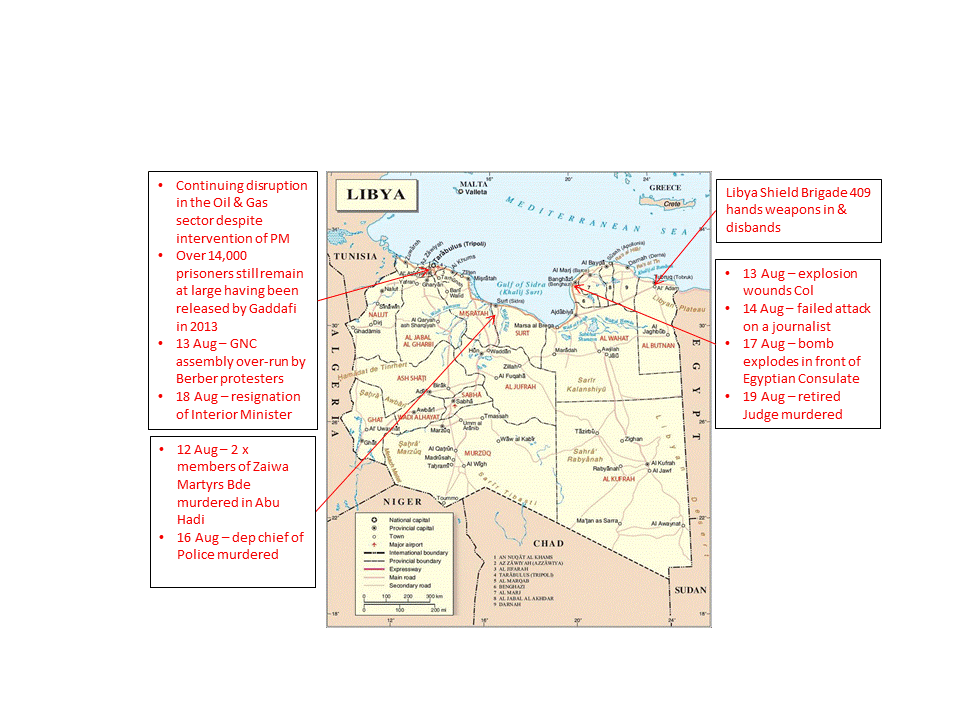Overview
General instability has remained the order of the day in Libya with assassinations in Benghazi, continuing disruptions to Libya’s critical oil and gas sector, the storming of the General National Congress (GNC) by Berbers angry at perceived marginalisation and the resignation of the Interior Minister.
It was disclosed this week that some 14,000 prisoners still remain at large following their release from prison by Colonel Gaddafi during the Revolution in 2011. The situation if anything is getting worse as it is just 3 weeks since 1,200 escaped during prison riots in Benghazi.
There have been relatively minor demonstrations in support of deposed President Morsi of Egypt and in protest at the recent killings of demonstrators and members of the Muslim Brotherhood in Egypt. A bomb did, however, explode outside the Egyptian Consulate in Benghazi on Saturday but causing only minor damage.
The Prime Minister has now involved himself in the continuing disruption to the country’s critical oil and gas sector by stating that the regional head of Petroleum facilities Guard had wanted to sell oil independently of Libya’s state National Oil Corporation (NOC) and that any attempt would be met with force. The disruption is not merely about conditions and pay but also plays into the broader separatist agenda of Cyrenaica. The disruption has hit the two major oil terminals at Es Sider and Ras Lanuf and according to the Oil and Gas Minister, Abdel-Barri Arrousi has cost the country nearly $1.6bn in lost revenues.
Tripolitania (Western Libya)
The GNC was overrun this week by Berber protesters, who ransacked the national assembly on 13th August in anger at what they saw as their marginalisation. The Berbers represent about 10% of Libya’s population and are demanding that they and their culture are acknowledged formally in the new constitution that is being drafted currently. The Berber representatives in the GNC withdrew from the assembly back in July for the same reasons.
The shock resignation by the Minister of the Interior, Mohammed Khalifa al-Sheikh on 18th August comes after less than 3 months of his appointment. He resigned blaming lack of moral and financial support from the Prime Minister and GNC. This will do little to encourage confidence in attempts to restore stability to the country.
Violence has flared this week in Gaddafi’s birthplace of Abu Hadi with the killing on 12th August of two of the Zaiwa Martyrs Brigade on their way there from Sirte. This was then followed on 16th August by the murder of Salem al-Magdobi, the deputy police chief in Abu Hadi. It is not known whether the two attacks are linked.
Cyrenaica (Eastern Libya)
Again Benghazi has seen a spate of targeted assassinations and attempts: on 13th August Colonel Jelal al-Arafi escaped an attack when he spotted an explosive device attached to his car which detonated before he could get clear wounding him in the foot; on 14th August Khadija al-Ammami from the Libya al-Ahrar television network escaped an attack on her as she drove to work when gunmen opened fire on her car; and then on 19th August Mohamed Ishqaim Khafayi, a retired judge was murdered following dawn prayers in the Souda Bint Zaama Mosque.
A bomb exploded in front of the Egyptian Consulate in Benghazi on 17th August in protest at the military takeover in Egypt, the removal of President Morsi and the death of well over 600 Muslim Brotherhood demonstrators in Cairo on 14th August when two protest camps were cleared by the Egyptian authorities. The bomb damaged the front of the building and wounded a guard slightly.
Finally it was announced this week that members of the Libya Shield Brigade 409 in Tobruk had handed their weapons and vehicles in and disbanded themselves.





